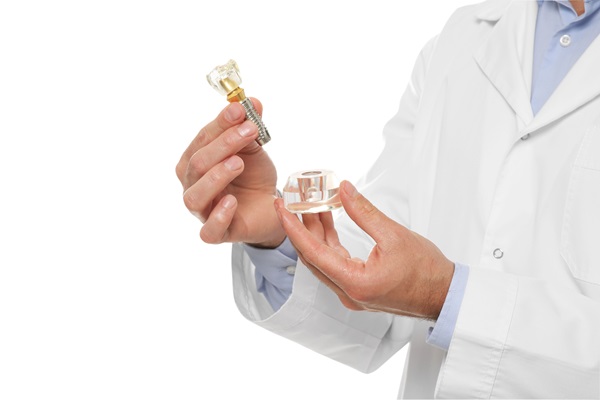An Overview of Implant Dentistry for Tooth Replacement

Many dentists recommend implants to patients who want natural-looking replacement teeth. This review discusses why many dentists consider implant dentistry to be a great way to replace missing teeth.
Is implant dentistry a good tooth-replacement solution?
The following are some important to know about implant dentistry for teeth replacement, including what implant dentistry actually is, the advantages of treatment over alternative solutions, and who should consider this type of treatment. This information may be helpful to you in order to make an informed decision about whether an implant dentistry treatment is right for you.
What is implant dentistry?
Implant dentistry is a treatment option for missing teeth. There are three components to implant dentistry restorations, which are the implant, the abutment, and the restoration. A dental implant is a small, screw-like post that is surgically placed into the jaw; the titanium implant then naturally fuses with the jawbone (through a process called osseointegration).
Once the jaw heals and osseointegration occurs, a second procedure is scheduled to place the abutment and restoration. For single tooth replacement, which only requires one implant and abutment, a dental crown (typically made of ceramic material) is attached. A bridge or denture, along with multiple implants, is used for replacing multiple teeth or an entire row of teeth.
What are the advantages of implant dentistry?
Dental implants preserve the density of the jawbone, preventing bone loss from occurring as a result of atrophy after the loss of teeth; this is why many dentists refer to implant dentistry as a more natural tooth-replacement solution. Dental implants are also not removable, and patients can care for them the same as they would their natural teeth. The restorations also look natural and offer superior strength and durability when compared to alternative solutions such as fixed bridges and removable dentures.
Are there any drawbacks or risks associated with implant dentistry?
It is helpful to review the potential drawbacks to dental implant restorations as well as the numerous advantages they provide. The most notable drawback for many patients is the time it takes to complete the implant process. While it may take less than a few months for a fixed dental bridge or a removable denture, it can take six to 12 months to complete the implant dentistry process. There are some risks involved with the surgical procedure for implant dentistry (during which the implants are placed in the jaw), but they are rare. In fact, the success rate is estimated to be around 98% (American Dental Association). The most notable risk, however, is a failure of the implant and the need to remove and replace it.
Do dental implants look and feel natural?
Dental implants look and feel very similar to natural teeth. In fact, they are in most cases indistinguishable from natural teeth. They also allow the patient to chew tougher foods without worrying about the restorations coming loose, similar to how one could with healthy natural teeth.
When should I choose dental implants for tooth replacement?
Dental implants are ideal for patients that want the most reliable and natural replacement solution long-term. The ideal patient should also have enough bone inside of the jaw to support dental implants or be willing and able to go through a bone graft procedure. The process can also take more than six months, so remaining patient throughout the process is important as well.
What can I expect during implant dentistry treatment?
There are several steps to the implant dentistry treatment process, starting with a consultation visit to establish a treatment plan. Many patients benefit from (or require) a bone graft procedure. This procedure involves the placement of a bone graft in an area of the jaw that has experienced bone loss from periodontal disease or atrophy after the loss of teeth.
Once the jaw is able to support the implants, the placement procedure is scheduled. It takes multiple months for osseointegration. After this occurs, the final procedure is scheduled, which involves placing dental abutments to each implant and attaching the crown, bridge, or complete denture.
Ready to schedule your appointment with us?
We take pride in assisting our patients through the implant dentistry process, answering any questions or concerns they have along the way. If you are missing one or multiple teeth and want to find out whether implant dentistry is right for you, call us and schedule a visit here at our dental office.
Request an appointment here: https://gallodental.com or call GDC Smiles at (770) 504-5725 for an appointment in our Gainesville office.
Check out what others are saying about our dental services on Yelp: Implants in Gainesville, GA.
Recent Posts
Not every patient requires a bone graft procedure before tooth replacement from an implant dentist, but it may be necessary for certain situations. This review discusses the role of bone grafting in the Implant dentistry process and what to expect before, during, and after a bone graft procedure.A bone grafting procedure is needed when there…
Dental patients who are planning a visit to an implant dentist may be unfamiliar with the details regarding implants. It is crucial to learn as much information as possible before scheduling an appointment for this surgical procedure.A dental implant is a common permanent tooth replacement option that can be highly beneficial to a patient’s health…
Considering implants? Read on to learn more about implant dentistry procedures from an implant dentist. Implant dentistry involves the placement of dental implants into the jaw, followed by the attachment of abutments and a dental prosthesis (e.g., crown, bridge, or denture). This article highlights the role the jawbone plays in the dental implant process and…
Considering an implant dentistry procedure? Read on to learn more about this type of restoration. With implant dentistry, replacing missing teeth has never been easier, and these restorations are generally indistinguishable from natural teeth. Dentists are often asked about how implant dentistry works. Due to the innovative structure of dental implant restorations, they are far…


